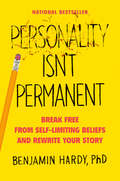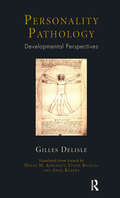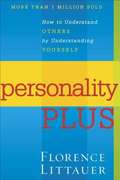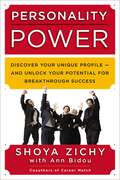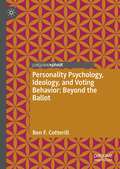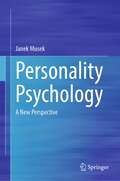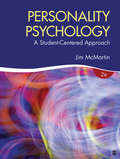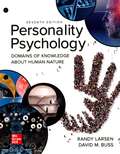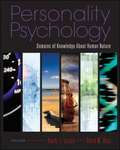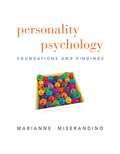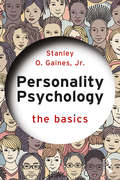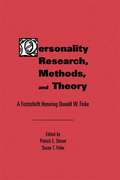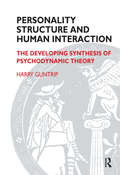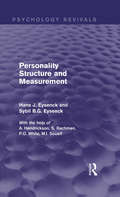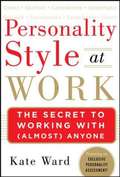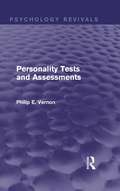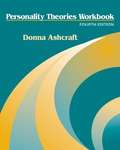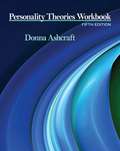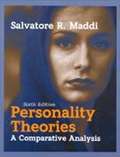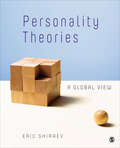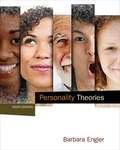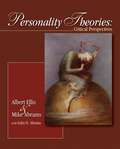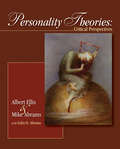- Table View
- List View
Personality Isn't Permanent: Break Free from Self-Limiting Beliefs and Rewrite Your Story
by Benjamin HardyPsychologist and bestselling author Benjamin Hardy, PhD, debunks the pervasive myths about personality that prevent us from learning—and provides bold strategies for personal transformation In Personality Isn&’t Permanent, Dr. Benjamin Hardy draws on psychological research to demolish the popular misconception that personality—a person&’s consistent attitudes and behaviors—is innate and unchanging. Hardy liberates us from the limiting belief that our &“true selves&” are to be discovered, and shows how we can intentionally create our desired selves and achieve amazing goals instead. He offers practical, science-based advice to for personal-reinvention, including: • Why personality tests such as Myers-Briggs and Enneagram are not only psychologically destructive but are no more scientific than horoscopes • Why you should never be the &“former&” anything--because defining yourself by your past successes is just as damaging to growth as being haunted by past failures • How to design your current identity based on your desired future self and make decisions here-and-now through your new identity • How to reframe traumatic and painful experiences into a fresh narrative supporting your future success • How to become confident enough to define your own life&’s purpose • How to create a network of &“empathetic witnesses&” who actively encourage you through the highs and lows of extreme growth • How to enhance your subconscious to overcome addictions and limiting patterns • How redesign your environment to pull you toward your future, rather than keep you stuck in the past • How to tap into what psychologists call &“pull motivation&” by narrowing your focus on a single, definable, and compelling outcome The book includes true stories of intentional self-transformation—such as Vanessa O&’Brien, who quit her corporate job and set the Guinness World Record for a woman climbing the highest peak on every continent in the fastest time; Andre Norman, who became a Harvard fellow after serving a fourteen-year prison sentence; Ken Arlen, who instantly quit smoking by changing his identity narrative; and Hardy himself, who transcended his childhood in a broken home, surrounded by issues of addiction and mental illness, to earn his PhD and build a happy family. Filled with strategies for reframing your past and designing your future, Personality Isn&’t Permanent is a guide to breaking free from the past and becoming the person you want to be.
Personality Pathology: Developmental Perspectives
by Gilles DelislePersonality pathology is rooted in early development and affects a wide range of affects, behaviours and cognitive processes. Every year thousands of articles about the etiology pf personality pathology are published in various professional or scientific reviews. There is a growing distance between the generalist's practice and our increasingly precise scientific knowledge. However, no one can read everything and therefore, it behoves us to ask ourselves the following questions: is the most recent better than what came before? Is the measurable and demonstrable necessarily clinically interesting? Must what interests the clinician be measured and proved? Whilst theory and clinical research are becoming increasingly precise, innumerable socio-economic forces are pressing for a simplification in clinical practice. "Shrinks" are fashionable! They are everywhere: in the workplace, on television, on the radio.
Personality Plus
by Florence LittauerAlthough we may not admit it to anyone else, all of us know there are areas in our personalities that need improvement.
Personality Power: Discover Your Unique Profile--and Unlock Your Potential for Breakthrough Success
by Shoya Zichy Ann BidouA recent Conference Board survey found that a staggering 53 percent of workers are dissatisfied with their jobs, but with the unemployment rate stubbornly high, searching for a new position may not be the answer. Based on the author’s proprietary personality model used by over 50,000 professionals worldwide, Personality Power shows you how to identify and harness your corestrengths to immediately improve your job satisfaction—and, ultimately, your success. After completing a simple 10-minute self-assessment, just turn to the in-depth chapter devoted to your personality type to: • Discover your work-related strengths and potential blind spots • Identify your ideal (and least-preferred) work environments • Learn how best to communicate with and coach others with different styles • Create a personal career roadmap complete with concrete steps for achieving your goals • And much more Featuring helpful charts, exercises, and inspiring success stories, Personality Power shows you how to leverage your natural talents and find the fulfillment and recognition you deserve.
Personality Psychology, Ideology, and Voting Behavior: Beyond the Ballot
by Ben F. CotterillThis book explores how our temperamental proclivities interact with our political leanings, shedding light on why people perceive the world differently. Focusing on the Five Factor Model of personality, currently the most popular framework in psychology research, the text unpacks the literature on the association between political orientations and personality traits. While only part of the puzzle, growing evidence suggests personality traits have a significant impact on our political convictions and voting patterns. In some instances, certain traits may even make individuals more prone to holding authoritarian and prejudicial views. Understanding these dynamics can help people better navigate political differences and conflicts, and will be of interest to students of personality psychology and students of political ideologies.
Personality Psychology: A New Perspective
by Janek MusekThis book integratively examines theories and models of the most essential findings of personality psychology with the aim of advancing personality knowledge. Since much empirical research is applied to very specific problems, the larger picture can get lost. Rather, this book starts from a coherent scientific theoretical framework, rather than presenting diverse theories of personality — phenomenological empirical, psychoanalytic behavioral, humanistic and cognitive perspectives — without enough critical examination. In this book, all theories, models and perspectives are reviewed and discussed within a unified theoretical framework of psychology Thus, historically and conceptually different models can be considered by scientific standards. Its insights will be highly relevant to academics, students and professional alike.
Personality Psychology: A Student-Centered Approach
by Dr James Jim McMartinPersonality Psychology: A Student-Centered Approach by Jim McMartin organizes the field of personality psychology around basic questions relevant to the reader’s past, present, and future selves. Answers to the questions are based on findings from up-to-date research and shed light on the validity of personality theories to help students deepen their understanding of their own personalities. Concise, conversational, and easy-to-understand, the Second Edition is enhanced with new chapters, new research that reflects the latest scholarship, and new photos and illustrations throughout.
Personality Psychology: A Student-Centered Approach
by Dr James Jim McMartinPersonality Psychology: A Student-Centered Approach by Jim McMartin organizes the field of personality psychology around basic questions relevant to the reader’s past, present, and future selves. Answers to the questions are based on findings from up-to-date research and shed light on the validity of personality theories to help students deepen their understanding of their own personalities. Concise, conversational, and easy-to-understand, the Second Edition is enhanced with new chapters, new research that reflects the latest scholarship, and new photos and illustrations throughout.
Personality Psychology: Domains of Knowledge About Human Nature
by David Buss Randy LarsenPERSONALITY PSYCHOLOGY: DOMAINS OF KNOWLEDGE ABOUT HUMAN NATURE, SEVENTH EDITION
Personality Psychology: Domains of Knowledge about Human Nature (4th Edition)
by David M. Buss Randy J. LarsenLarsen (personality psychology, Washington U., St. Louis) and Buss (psychology, U. of Texas at Austin) explain the study of personality through six key domains of knowledge about personality functioning--dispositional, biological, intrapsychic, cognitive-experiential, social and cultural, and adjustment domains--rather than by traditional grand theories of personality. In addition, they integrate culture, gender, and biology. Streamlined, this edition has updated research; an updated discussion on correlates of personality dimensions, including neuroticism, extraversion, agreeableness, conscientiousness, and combinations of personality traits; added features that look closely at specific topics; expanded coverage of longitudinal studies; a new theory of stable individual differences; expanded explanation of balancing selection; new material on the evolution of group living and social motivation, the locus of control and real-world outcomes, anger proneness, self-recognition in animals, and intelligence; and new examples and graphics.
Personality Psychology: Foundations and Findings
by Marianne MiserandinoThis book introduces students to the basic foundations and latest findings by presenting the fundamental questions, accumulated knowledge, and latest findings in genetics, neuroscience, traits, self and identity, intrapsychic aspects, regulation, motivation, and cognition, as well as the integration across these areas. Personality Psychology is an undergraduate textbook for personality psychology: the study of individual differences, for identifying ways in which people are both similar and different and for explaining how they became that way. Written with an approachable, story-telling style, the author presents an evidence-based text with integrated culture references and the key building blocks of the subject matter: genetics, neuroscience, and cognition. Miserandino is an APA-award winning teacher and has placed learning tools such as self-assessments within each chapter that guide students into a complete understanding throughout the text.
Personality Psychology: The Basics (The Basics)
by Stanley Gaines Jr.Personality Psychology: The Basics provides a jargon-free and accessible overview of the discipline, focusing on why not all individuals think, feel, speak, or act the same way in the same situation. The book offers a brief history of the area, covering a range of perspectives on personality including psychodynamic, behaviourist, humanistic, and cognitive approaches. Also featuring fascinating case studies to richly illustrate the theories discussed, the text looks at influential theories and related research within each of the major schools of thought in personality psychology. Rigorously examining the fundamental principles of personality psychology, the author concludes by outlining the future of the area in relation to cutting edge research and potential future trends. Exploring the major personality theories that seek to explain why people behave as they do in eight reader-friendly chapters, this is an essential introduction for students who are approaching personality psychology for the first time.
Personality Research, Methods, and Theory: A Festschrift Honoring Donald W. Fiske
by Susan T. Fiske Patrick E. ShroutDonald W. Fiske's professional life and collaborations are themselves a textbook in the development of the field of personality. From the field's early origins in personnel selection, rating accuracy, and psychotherapy outcomes, to its current status of theoretical and methodological maturity -- complete with mid-life crises -- the field has been fundamentally changed by Fiske's work, and the changes have influenced generations of scholars. This festschrift is a celebration of Fiske's impact, but not merely of his impact on the history of personality research. Instead, the volume focuses on ongoing debates and issues that have been framed or influenced by Fiske's work. The festschrift's three sections are organized around three themes in Fiske's writings -- themes that also correspond to three periods in his career. This volume examines current thinking about what can be known about personality, how constructs relevant to personality psychology are best measured, and how to approach specific research problems in personality and related fields. The contributors create an eminent cross-section of the development and current status of personality methods. In addition to Fiske's eminent contemporaries, the contributors to this volume include Fiske's former students, collaborators, and his two children, both of whom are behavioral scientists. The accomplishments of his students, colleagues, and children testifies to the range of psychologists who have benefited from his scholarly and practical wisdom. This collection is a valuable textbook for an advanced graduate course as well as appealing as a scholarly resource. Many of the contributors are renown psychological leaders who have made available their latest original thoughts. The book concludes with an essay by Fiske offering his perspective on the central themes: behavioral and social science metatheory, methods, and strategies.
Personality Structure and Human Interaction: The Developing Synthesis of Psychodynamic Theory
by Harry Y. GuntripHow has a theory of man as a social being to be formulated if we are to do justice to his individuality, to the subtle ways in which his love and hate compete within his relations with others and to the anxieties and resistances he shows when he seeks to change himself? To answer this question is the task which the author sets himself. After assessing Freud's basic principles, the author proceeds to make a uniquely comprehensive review of subsequent theoretical contributions to psychoanalysis with special emphasis on the work of Fairbairn and Melanie Klein. From a background of philosophy, theology and social studies, the author went on to take a personal psychoanalysis and to become a full time psychotherapist, and it is from this combination of wide knowledge and intensive work with people beset by conflicts in their relations with themselves and others that he evolves his views.
Personality Structure and Measurement (Psychology Revivals)
by Hans J. Eysenck Sybil B.G. EysenckOriginally published in 1969, this book deals extensively with the description and measurement of personality. Beginning with a statement of the principles of typological research in psychology, set against the background of general taxonomic principles in biology, the study discusses in detail results and generalisations from the Eysencks’ previous work. The second part of the book describes several large-scale studies using personality questionnaires prepared by the authors, as well as the standard ones of Cattell and Guilford. There is a comparative study of the Eysenck, Cattell and Guilford inventories, which analyses the degree to which similar factors can be found in these three instruments and discusses areas of agreement and disagreement between the three authors. The third part deals with personality studies in children, and includes a chapter on personality structure in subnormal subjects. These studies are concerned with discovering the extent to which personality structure changes with increasing age, and to what extent it is possible to measure personality in younger children. They also examine sex differences in personality structure, and show quite marked differences between the sexes on a number of primary personality traits. The results of the Eysencks’ work in this field directed new light on the structure of personality and cast doubt on many widely accepted findings of the time.
Personality Style at Work: The Secret to Working With (Almost) Anyone
by Kate WardMAKE EVERY WORKPLACE INTERACTION POSITIVE AND PRODUCTIVE Named a "Best Career Book 2012" by FINS Finance "Personality Style at Work provides you with the insight and tools to understand your style and to adapt it to others' preferences. Implement the concepts in this book to ensure that you will be a better communicator, team member, and leader. " --ELAINE BIECH, author of The Business of Consulting and editor of The ASTD Leadership Handbook "Kate has done a tremendous job using the Personality Style Model to help us each be the best we can be every day. " --LOU RUSSELL, CEO/Learning Facilitator, Russell Martin & Associates, and author of IT Leadership Alchemy, The Accelerated Learning Fieldbook, Project Management for Trainers, and 10 Steps to Successful Project Management "Personality Style at Work is a fresh and timely approach to the interplay of personality styles in the workplace. You may not need this book if you are a hermit, but it is a must-read for anyone working on a daily basis with other people!" --SHARON BOWMAN, international trainer and author of Training from the Back of the Room "Kate Ward presents a simple, useful model for looking at how personality style affects performance. A great fi nd for anyone interested in improving their everyday interactions. " --GEOFF BELLMAN, consultant and author of Extraordinary Groups: How Ordinary Teams Achieve Amazing Results About the Book: The most important business skill isn't a skill at all. It's your personality. And only when you develop a keen understanding of your personality style--and the styles of the people you deal with--will you reach your full potential as a business professional. Personality Style at Work reveals the proven personality style model used by HRDQ, a trusted developer of training materials--giving you one of today's most valuable tools for leading others, contributing to teams, effectively communicating with coworkers, and making better decisions. This groundbreaking guide helps you achieve positive results in virtually any workplace situation. Whether you're a high-level manager, a salesperson, a customer service professional, or an entry-level employee, you'll learn why others behave as they do in specifi c situations and how to use that knowledge to turn every interpersonal encounter into a win-win scenario. The HRDQ model has been administered to more than one million people--and it has generated remarkable results. It is based on four principal personality styles: Direct: High assertiveness, low expressiveness Spirited: High assertiveness, high expressiveness Considerate: Low assertiveness, high expressiveness Systematic: Low assertiveness, low expressiveness Which one describes you? Knowing the answer is the first step to achieving consistently positive and productive personal interactions--which is why Personality Style at Work includes an assessment that you can take to identify your style. Armed with this valuable self-assessment, you can adapt your behavior to create more practical, harmonious working relationships. Personality Style at Work opens the door to a whole new way of interacting with others in a way that benefits you, your coworkers, your customers, and your entire organization.
Personality Tests and Assessments (Psychology Revivals)
by Philip E. VernonOriginally published in 1953 this book provided the first comprehensive account of methods of personality assessment by a British author. It starts with a short survey of personality theory, pointing out the difficulties in any method of testing or assessment. Next it describes the weaknesses of the common interview method. (Throughout the emphasis is on methods which are usable in educational or vocational guidance and selection, not on methods which are mainly of scientific interest.) Thereafter it takes up each main type of technique – tests based on physique or psychological measures, on expressive movement such as gestures and handwriting, tests of behaviour (including War Office Selection Board ‘house party’ methods), ratings and rating scales, questionnaires, and so-called projective techniques. The evidence for or against each test or method is surveyed and numerous references provided for relevant literature. Illustrative excerpts are given of many of the more promising tests, and some pictorial illustrations. British work in this field at the time is covered completely, and an attempt is made to provide a fair summary of the main contributions of American and other psychologists of the day.
Personality Theories Workbook (4th edition)
by Donna AshcraftThe case studies in PERSONALITY THEORIES WORKBOOK, 4th edition, help you learn and apply personality theories to real-life examples of typical--rather than abnormal--behavior. While most personality texts present just the major concepts of personality theories, Donna Ashcraft's unique workbook ensures that you thoroughly understand examples and enables you to put theories into practice. The text's wide range of case studies is accompanied by questions that guide you through an analysis of the case, prompting you to consider how a particular theorist would view it. Additional exercises ensure that you understand the differences between each theory. Succinct, affordable, and accessible, PERSONALITY THEORIES WORKBOOK combines an excellent assortment of cases with critical-thinking questions and greater application of theories to your personal life. The result is solid understanding.
Personality Theories Workbook (5th Edition)
by Donna AshcraftThe case studies in PERSONALITY THEORIES WORKBOOK, 5e, help you learn and apply personality theories to real-life examples of typical--rather than abnormal--behavior. While most personality texts present just the major concepts of personality theories, Donna Ashcraft's unique workbook ensures that you thoroughly understand examples and enables you to put theories into practice. The text's wide range of case studies is accompanied by questions that guide you through an analysis of the case, prompting you to consider how a particular theorist would view it. Additional exercises ensure that you understand the differences between each theory. Succinct, affordable, and accessible, PERSONALITY THEORIES WORKBOOK, 5e, combines an excellent assortment of cases with critical-thinking questions and greater application of theories to your personal life. The result is solid understanding.
Personality Theories: A Comparative Analysis 6th Edition
by Salvatore R. MaddiThis well-organized text gives direction to students of personality in their efforts to understand the whole person. Maddi's conversational style encourages thinking instead of memorizing, thereby helping readers master principles rather than merely accepting the principles of one theory or another. He explains, compares, and contrasts a number of different personality theories to illuminate the overall models of human behavior they express.
Personality Theories: A Global View
by Eric ShiraevPersonality Theories: A Global View by leading scholar Eric Shiraev takes a dynamic, integrated, and cross-cultural approach to the study of personality. The text is organized around three general questions: Where did personality theories come from? How did the theorists study facts? How do we apply personality theories now? These questions provide a consistent focus on social context, interdisciplinary science, and applications. Going beyond traditional research from the Western tradition, the book also covers theories and studies rooted in the experiences of other countries and cultures.
Personality Theories: A Global View
by Eric ShiraevPersonality Theories: A Global View by leading scholar Eric Shiraev takes a dynamic, integrated, and cross-cultural approach to the study of personality. The text is organized around three general questions: Where did personality theories come from? How did the theorists study facts? How do we apply personality theories now? These questions provide a consistent focus on social context, interdisciplinary science, and applications. Going beyond traditional research from the Western tradition, the book also covers theories and studies rooted in the experiences of other countries and cultures.
Personality Theories: An Introduction, Student Edition (Cengage Advantage Books)
by Barbara EnglerThe Ninth Edition of PERSONALITY THEORIES continues to provide thorough coverage enhanced with helpful learning aids, opportunities for honing critical thinking skills, and integration of multicultural and gender-related issues. Each chapter focuses on one theory or group of theories and includes brief biographies that shed light on how the theories were formed. The author also provides criteria for evaluating each theory and cites current relevant research. A final chapter on Zen Buddhism covers a major non-Western theory of personality and serves to distinguish this program in the field.
Personality Theories: Critical Perspectives
by Albert Ellis Mike Abrams Lidia Dengelegi AbramsPersonality Theories: Critical Perspectives is the groundbreaking, final text written by Albert Ellis, long considered the founder of cognitive behavioral therapies. The book provides students with supporting and contradictory evidence for the development of personality theories through time. Without condemning the founding theorists who came before him, Ellis builds on more than a century of psychological research to re-examine the theories of Freud, Jung, and Adler while taking an equally critical look at modern, research-based theories, including his own.
Personality Theories: Critical Perspectives
by Albert Ellis Mike Abrams Dr Lidia Dengelegi AbramsPersonality Theories: Critical Perspectives is the groundbreaking, final text written by Albert Ellis, long considered the founder of cognitive behavioral therapies. The book provides students with supporting and contradictory evidence for the development of personality theories through time. Without condemning the founding theorists who came before him, Ellis builds on more than a century of psychological research to re-examine the theories of Freud, Jung, and Adler while taking an equally critical look at modern, research-based theories, including his own.
